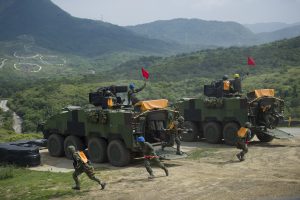The Diplomat author Mercy Kuo regularly engages subject-matter experts, policy practitioners, and strategic thinkers across the globe for their diverse insights into U.S. Asia policy. This conversation with Mark Cancian (Colonel, USMCR, ret.) – senior adviser at the Center for Strategic and International Studies in Washington DC and coauthor of the CSIS report “The First Battle of the Next War: Wargaming a Chinese Invasion of Taiwan” – is the 352nd in “The Trans-Pacific View Insight Series.”
Identify the critical conditions to prevent China from succeeding in an invasion of Taiwan.
The project identifies five critical conditions for success:
- Taiwan must resist forcefully and effectively. The rest is futile if the government collapses or the population becomes demoralized.
- Taiwanese ground forces must hold the line. Chinese forces will always be able to land on the island. Taiwanese ground forces must be able to contain the beachhead and then counterattack forcefully as Chinese logistics weaken. However, the Taiwanese ground forces have severe weaknesses. Therefore, Taiwan must fill its ranks and conduct rigorous, combined arms training. Ground forces must become the center of Taiwan’s defense effort.
- Taiwan must start the war with everything it needs. In the Ukraine war, the United States and NATO have sent massive amounts of equipment and supplies to Ukraine. Russia has been unable to interdict this overland flow. However, the “Ukraine model” cannot be replicated in Taiwan because China’s massive air and naval forces can isolate the island for weeks or even months.
- The United States must be able to use its bases in Japan for combat operations. While other allies (e.g., Australia and South Korea) are important in the broader competition with China and may play some role in the defense of Taiwan, Japan is critical. U.S. fighter/attack aircraft, because of their relatively short range, must be able to operate from U.S. bases in Japan.
- If the United States is going to defend Taiwan, it must begin operations against China immediately. Delays caused by hesitation or extended decision-making increase the cost and decrease the likelihood of success.
Explain the strategic relevance of wargaming operational outcomes of a potential conflict over Taiwan.
Because a Taiwan contingency is the pacing scenario for the U.S. military, it is critical to have a shared, rigorous, and transparent understanding of the operational dynamics of such an invasion. The Department of Defense has done much classified wargaming, but details are not available for public discussion. This project did three things:
First, it used only publicly available information. Therefore, it can be transparent about its assumptions, dynamics, and outcome. This transparency allows the broadest possible discussion of this critical national security issue.
Second, it ran the wargame 24 times with many different participants and in a wide variety of scenarios. This produced an analytically sound basis for insights and recommendations.
Third, it built tables and computer programs based on history and weapons test results to calculate movement and resolve combat. Outcomes were, therefore, objective and consistent across all 24 iterations.
Describe the wargame’s base scenario with key variables and assumptions.
The project made assumptions about the participation of allies and partners, the availability of forces, and the effectiveness of weapons. The base case used the most likely assumptions, but excursions explored the impact of alternative assumptions. For example, the base case assumed that Japan would allow the United States to use its bases in Japan for operations. However, Japan would not participate unless China attacked Japanese territory. An excursion explored what would happen if Japan stayed strictly neutral.
Regarding Taiwan, the base case assumed that the United States would not send any military forces to Taiwan during a crisis lest that precipitate the conflict that the United States was trying to avoid. An excursion allowed a Marine Corps Littoral Regiment to be deployed before conflict began.
Analyze the topline takeaways of the wargame.
In most scenarios, the U.S. coalition defeated a conventional amphibious invasion by China and maintained an autonomous and democratic Taiwan. However, this defense came at a high cost. The coalition lost dozens of ships, hundreds of aircraft, and thousands of servicemembers. Taiwan’s economy was devastated. The high losses would damage the U.S. global position for many years. Victory is, therefore, not enough. The United States needs to strengthen deterrence immediately.
China also lost heavily, and its failure to occupy Taiwan might destabilize Chinese Communist Party rule. The game results should therefore cause the Chinese leadership to think carefully about its future military actions.
Assess whether the United States and key allies are prepared for a possible military conflict over Taiwan.
The United States and its allies have taken concrete actions to better prepare for such a conflict. For example, the United States and Japan recently reached a series of agreements that would strengthen deterrence against China. Yet more needs to be done.
The report makes many recommendations to strengthen deterrence and enhance warfighting capabilities if deterrence fails. Four key recommendations are as follows:
- Increase the inventory of long-range anti-ship munitions. The current inventory runs out in a few days.
- Build hardened shelters to protect aircraft on the ground in Japan and Guam. Ninety percent of coalition aircraft losses occur on the ground, destroyed by Chinese missile strikes.
- Move the structure of Taiwanese air and naval forces toward asymmetry. The balanced military forces that served Taiwan well for the last 70 years are no longer appropriate in the face of overwhelming Chinese air and maritime power. Taiwan needs to move towards a “porcupine strategy.”
- Recognize the need to continue operations in the face of heavy casualties. This is a cultural issue. In three weeks, the United States will suffer about half as many casualties as it did in 20 years of war in Iraq and Afghanistan. This will be a shock to a military accustomed to having military dominance.
































